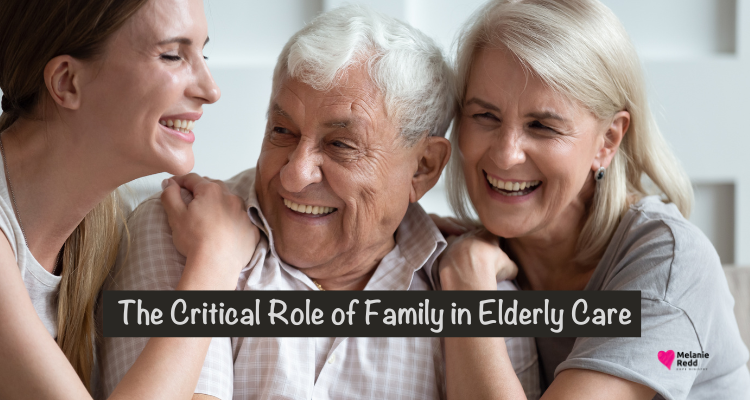The Critical Role of Family in Elderly Care

The Critical Role of Family in Elderly Care: How Emotional Support Enhances Well-Being
As our population ages, the need for elderly care becomes increasingly vital. Families are often at the forefront of this care, which is pivotal in ensuring their elderly loved ones receive the support they need. While physical care is essential, the emotional support that family members provide is equally crucial. Emotional well-being directly influences seniors’ overall quality of life, and family involvement is often the key to fostering this well-being.
The Importance of Family in Elderly Care
Traditionally, families have been the cornerstone of elderly care. This practice goes back centuries, when multigenerational households were ordinary, and elders were cared for by their children and grandchildren. While societal changes have led to more elderly individuals living independently or in care facilities, the role of the family remains critical.
Also, family members possess a unique bond with their elderly loved ones, rooted in years of shared experiences and deep understanding. This bond allows family caregivers to notice subtle changes in health, behavior, or mood that might go unnoticed by others. The presence of family provides emotional comfort, a sense of security, and the familiarity of a loving environment. When family members are involved, elderly individuals often feel more understood and valued, directly contributing to their emotional and psychological well-being.
Emotional Support as a Key Component of Well-Being
Emotional support is a broad term encompassing actions that provide comfort, reassurance, and a sense of belonging. In elderly care, emotional support includes listening to concerns, offering companionship, and maintaining a connection to the family and community.
The benefits of emotional support are profound. Psychologically, it can reduce feelings of loneliness, anxiety, and depression, which are common among the elderly. Therapy dogs for seniors are a wonderful example of this, providing companionship and unconditional love that can significantly improve mental well-being. Even more, emotionally supported individuals are likelier to maintain a positive outlook, feel more in control of their lives, and have a stronger sense of purpose.
Moreover, the physical benefits are also significant. Studies show that emotional well-being can lead to better health outcomes, including lower blood pressure, improved immune function, and a reduced risk of chronic diseases. For elderly individuals who often face multiple health challenges, emotional support can be critical in maintaining their overall health.
The CDPAP (Consumer Directed Personal Assistance Program) and Family Involvement
One program that effectively bridges the gap between professional care and family involvement is the Consumer Directed Personal Assistance Program (CDPAP). CDPAP is a Medicaid program that allows consumers, including the elderly, to hire and direct their caregivers. What sets CDPAP apart is its flexibility—family members, excluding spouses, can be hired and compensated as caregivers. This program offers a unique opportunity for those in New York to get paid to care for a family member in NY, ensuring that the care provided is personalized and compassionate.
Indeed, the benefits of CDPAP are extensive. It allows for a more personalized approach to care, as family members who know the elderly person’s preferences and routines can provide the necessary support. Also, this arrangement fosters a deeper emotional connection, as the care is not just a job but an act of love and responsibility. Combining physical care with the emotional support that family members provide can significantly enhance the well-being of elderly individuals.
Challenges in Family-Based Elderly Care
While family involvement in elderly care is invaluable, it is not without challenges. The demands of caregiving can be overwhelming, especially when balancing other responsibilities such as work, children, and personal needs. Caregivers often face significant time constraints and financial strain. The emotional burden of watching a loved one’s health decline can be heavy, leading to caregiver burnout if not addressed.
Also, self-care is crucial for family caregivers. Without it, they risk exhaustion, which can negatively affect their well-being and the quality of care they provide. Resources such as respite care, support groups, and financial assistance programs are available to help alleviate some of these pressures. Respite care, for example, offers temporary relief by providing professional care for the elderly, allowing caregivers to rest and recharge.
Strategies for Enhancing Emotional Support in Elderly Care
Providing emotional support doesn’t always require grand gestures. Simple, consistent actions often make the most significant impact. Families can enhance their emotional support through active listening, where they give their full attention to the elderly, acknowledge their feelings, and respond with empathy. Regular visits, phone calls, or even video chats can help maintain a strong connection, especially for those who do not live nearby.
In addition, engaging in meaningful activities, such as reminiscing, participating in hobbies, or simply enjoying a meal together, can also strengthen emotional bonds. These activities give the elderly a sense of purpose and help them feel valued.
Technology can also help maintain emotional connections. Video calls, social media, and other digital tools can help bridge the distance between family members. Encouraging open communication, where the elderly feel comfortable expressing their needs and concerns, is essential in ensuring they feel heard and supported.
It’s also beneficial to involve extended family and community members in care efforts. This collective approach lightens the load for the primary caregiver and enriches the elderly’s social interactions, further enhancing their emotional well-being.
Conclusion
Family involvement in elderly care is irreplaceable. The emotional support that family members provide can significantly enhance the well-being of seniors, offering comfort, reducing stress, and improving overall health. Programs like CDPAP highlight the importance of combining professional care with the unique, loving touch only a family can provide.
While challenges exist, the rewards of being actively involved in a loved one’s care are immeasurable. By fostering strong emotional connections, maintaining open communication, and utilizing available resources, families can play a crucial role in ensuring their elderly loved ones lead fulfilling, happy lives. The well-being of our elders is a reflection of the care and love they receive from those closest to them.
Were you encouraged by what you read?
Then, would you share this article with a friend, co-worker, or family member?
Or, maybe you can send it to a friend or family member?
This blog occasionally uses affiliate links and may contain affiliate links.
Additionally, Melanie Redd is a participant in the Amazon Services LLC Associates Program.
This is an affiliate advertising program designed to provide a means for sites to earn advertising fees. These are earned by advertising and linking to amazon.com.
Also, for more on my disclosure policy, click HERE.
© Melanie Redd and Hope Ministry, 2024. Unauthorized use and/or duplication of this material without express and written permission from this blog’s author and/or owner is strictly prohibited.
Further, excerpts and links may be used, provided that full and clear credit is given to Melanie Redd and Hope Ministry.
Please give appropriate and specific directions to the original content.




0 Comments